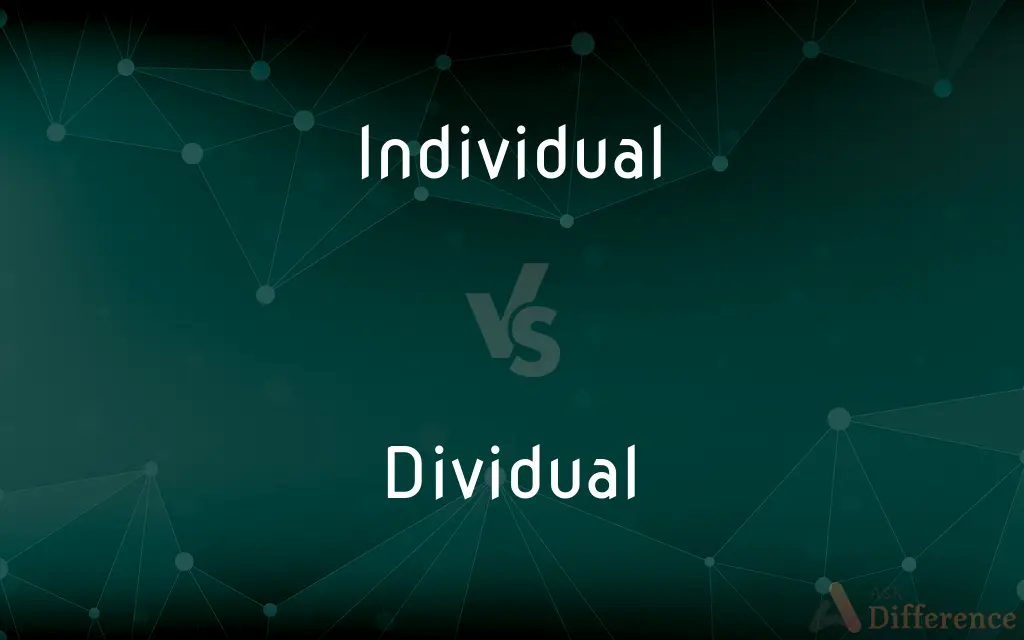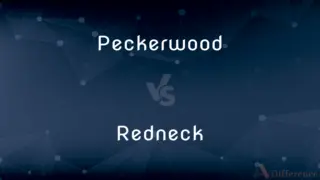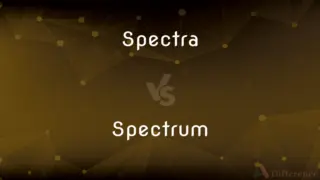Individual vs. Dividual — What's the Difference?
By Urooj Arif & Maham Liaqat — Updated on March 13, 2024
Individuals are seen as autonomous entities, while dividuals are parts of a larger whole, emphasizing interdependence.

Difference Between Individual and Dividual
Table of Contents
ADVERTISEMENT
Key Differences
Individuals are often perceived as self-contained units with their own identities, rights, and responsibilities, defined by their unique characteristics and capabilities. On the other hand, the concept of the dividual suggests a person who is divided and interconnected with others, emphasizing the importance of social relations and communal aspects in shaping one's identity.
While individualism highlights personal freedom, autonomy, and self-reliance, the idea of being a dividual focuses on the interconnectedness of people, where identity and value are derived from social networks and communal bonds.
In societies that prioritize individuality, there is a strong focus on personal achievements, independence, and self-expression. Conversely, cultures that embrace the notion of dividuation often value collective well-being, shared responsibilities, and social harmony over individual accomplishments.
The individual is central in contexts that value personal rights and liberties, where the law and social structures are designed to protect individual interests. Whereas in a dividual-oriented society, the emphasis is on collective rights and duties, with social norms and legal systems that prioritize group interests and cohesion.
Individuals are often encouraged to compete and stand out in their social and professional environments, fostering innovation and personal growth. In contrast, dividuals are encouraged to collaborate and contribute to the collective, fostering a sense of belonging and mutual support.
ADVERTISEMENT
Comparison Chart
Definition
A distinct, autonomous entity with unique characteristics.
A part of a larger whole, emphasizing interconnectedness.
Focus
Personal autonomy, rights, and responsibilities.
Collective well-being, shared responsibilities, and social relations.
Societal Value
Personal achievements and self-reliance.
Collective well-being and social harmony.
Legal and Social Structures
Protect individual interests and rights.
Prioritize group interests and social cohesion.
Encouraged Behavior
Competition and individualism.
Collaboration and contribution to the collective.
Compare with Definitions
Individual
An individual possesses self-governance and independence.
Individuals make personal decisions without external influence.
Dividual
Dividuals are fundamentally connected to others in their community.
Dividuals share resources and support within their community.
Individual
Individuals are entitled to certain freedoms and protections.
The right to free speech allows individuals to express themselves without fear.
Dividual
Dividuals see themselves as part of a larger social or cultural entity.
A dividual's actions are often guided by the needs of their community.
Individual
Each individual has a unique set of characteristics that define them.
Personal hobbies and experiences shape an individual's identity.
Dividual
Dividuals collectively share duties and obligations.
Environmental stewardship is a shared responsibility among dividuals.
Individual
Individuals are encouraged to be self-sufficient.
Successful individuals often exhibit strong self-reliance skills.
Dividual
The health and happiness of the community are central to dividuals.
Dividuals celebrate communal achievements and support each other in times of need.
Individual
Individuals are accountable for their actions.
Each individual must take responsibility for their environmental impact.
Dividual
Dividuals prioritize the well-being of their community.
Dividuals make sacrifices for the greater good of their society.
Individual
An individual is that which exists as a distinct entity. Individuality (or self-hood) is the state or quality of being an individual; particularly (in the case of humans) of being a person unique from other people and possessing one's own needs or goals, rights and responsibilities.
Dividual
Separate, distinct.
Individual
Single; separate
Individual tiny flowers
Dividual
Divisible, divided.
Individual
Of or for a particular person
The individual needs of the children
Dividual
Shared, held in common (with others).
Individual
A single human being as distinct from a group
Boat trips for parties and individuals
Dividual
Divided, shared, or participated in, in common with others.
Individual
Of or relating to an individual, especially a single human
Individual consciousness.
Individual
By or for one person
Individual work.
An individual portion.
Individual
Existing as a distinct entity; separate
Individual drops of rain.
Individual
Marked by or expressing individuality; distinctive or individualistic
An individual way of dressing.
Individual
Special; particular
Each variety of melon has its individual flavor and texture.
Individual
Serving to identify or set apart
"There was nothing individual about him except a deep scar ... across his right cheek" (Rebecca West).
Individual
A single human considered apart from a society or community
The rights of the individual.
Individual
A human regarded as a distinctive or unique personality
Always treated her clients as individuals.
Felt he was quite an individual.
Individual
A single organism as distinguished from a species, community, or group.
Individual
A member of a collection or set; a specimen.
Individual
A person considered alone, rather than as belonging to a group of people.
He is an unusual individual.
Individual
(legal) A single physical human being as a legal subject, as opposed to a legal person such as a corporation.
Individual
An object, be it a thing or an agent, as contrasted to a class.
Individual
(statistics) An element belonging to a population.
Individual
Relating to a single person or thing as opposed to more than one.
As we can't print them all together, the individual pages will have to be printed one by one.
Individual
Intended for a single person as opposed to more than one person.
Individual personal pension; individual cream cakes
Individual
Not divisible without losing its identity.
Individual
Not divided, or not to be divided; existing as one entity, or distinct being or object; single; one; as, an individual man, animal, or city.
Mind has a being of its own, distinct from that of all other things, and is pure, unmingled, individual substance.
United as one individual soul.
Individual
Of or pertaining to one only; peculiar to, or characteristic of, a single person or thing; distinctive; as, individual traits of character; individual exertions; individual peculiarities.
Individual
A single person, animal, or thing of any kind; a thing or being incapable of separation or division, without losing its identity; especially, a human being; a person.
An object which is in the strict and primary sense one, and can not be logically divided, is called an individual.
That individuals die, his will ordains.
Individual
An independent, or partially independent, zooid of a compound animal.
Individual
A human being;
There was too much for one person to do
Individual
A single organism
Individual
Being or characteristic of a single thing or person;
Individual drops of rain
Please mark the individual pages
They went their individual ways
Individual
Separate and distinct from others of the same kind;
Mark the individual pages
On a case-by-case basis
Individual
Characteristic of or meant for a single person or thing;
An individual serving
Separate rooms
Single occupancy
A single bed
Individual
Concerning one person exclusively;
We all have individual cars
Each room has a private bath
Common Curiosities
Why is individualism valued in some societies?
Individualism is valued for promoting personal freedom, innovation, and self-expression.
What defines an individual?
An individual is defined by their unique characteristics, autonomy, and personal responsibilities.
Can someone be both an individual and a dividual?
Yes, depending on the cultural context and social situations, a person can exhibit both individualistic and dividuated traits.
How does a dividual differ from an individual?
A dividual is part of a larger whole and emphasizes interconnectedness and collective well-being, unlike the autonomous and self-reliant individual.
Are children raised differently in individualistic vs. dividuated cultures?
Yes, individualistic cultures often emphasize self-reliance and personal achievement, while dividuated cultures focus on communal values and cooperation.
What are the consequences of extreme individualism?
Extreme individualism can lead to isolation, reduced social cohesion, and neglect of communal responsibilities.
Can individualism coexist with community values?
Yes, many societies find a balance between valuing individual rights and fostering a sense of community.
How do dividuals contribute to their community?
Dividuals contribute by sharing responsibilities, maintaining social harmony, and prioritizing collective well-being.
How do individual and dividual perspectives impact environmental responsibility?
Individuals might focus on personal sustainability efforts, while dividuals emphasize collective environmental stewardship.
How does the concept of a dividual affect social structures?
In dividual-oriented societies, social structures emphasize collective rights, duties, and harmony.
How do legal systems differ in individualistic and dividuated societies?
Legal systems in individualistic societies protect personal rights, while in dividuated societies, they may prioritize collective interests.
What role does autonomy play in defining an individual?
Autonomy is central to the concept of an individual, highlighting self-governance and independence.
How do individualistic and dividuated societies approach problem-solving?
Individualistic societies might encourage individual innovation, while dividuated societies prioritize collaborative and communal solutions.
Is competition discouraged in dividuated cultures?
Not necessarily discouraged, but collaboration and collective success are often more valued.
Do dividuated cultures suppress personal identity?
Not necessarily, but personal identity may be more intertwined with community identity in dividuated cultures.
Share Your Discovery

Previous Comparison
Peckerwood vs. Redneck
Next Comparison
Spectra vs. SpectrumAuthor Spotlight
Written by
Urooj ArifUrooj is a skilled content writer at Ask Difference, known for her exceptional ability to simplify complex topics into engaging and informative content. With a passion for research and a flair for clear, concise writing, she consistently delivers articles that resonate with our diverse audience.
Co-written by
Maham Liaqat













































